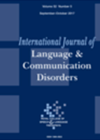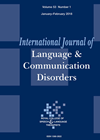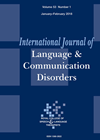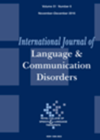
Journal Reviews
Strategies to improve early development of vocabulary post-cochlear implantation
Cochlear Implantation (CI) is now the standard of care for rehabilitation of children with bilateral severe to profound sensorineural hearing loss. It improves the children’s linguistic input and helps them to develop language. The literature published so far has shown...
Semantic fluency test to investigate deaf children
Semantic fluency task (SFT) is used to measure lexical organisation and executive function across the lifespan and requires participants to name examples from a particular semantic category in a specific period of time. Using this test, the authors investigated a...
Lack of early vocabulary growth in bilateral cochlear implant children
Studies indicate that children with unilateral implantation may have delayed vocabulary development for long periods of time even after implantation. This Finnish study attempted to find out whether bilateral cochlear implantation was associated with earlier vocabulary development. The authors analysed...
Early habilitation for hearing impairment in children with Down syndrome
Approximately 40-80% of children with Down syndrome have hearing impairment in addition to speech and language impairment. The commonest cause of hearing impairment in young children is otitis media with effusion. This paper investigated the impact of early hearing loss...









